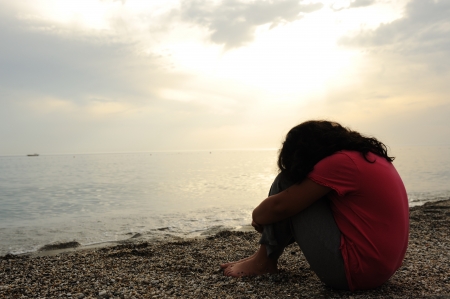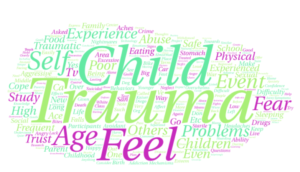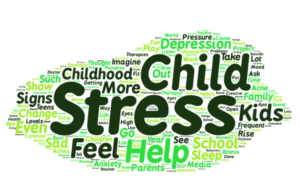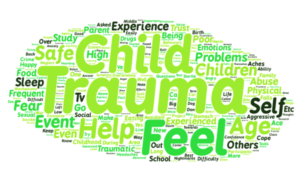Do children experience trauma? Will trauma affect a child’s ability to be happy? Are the effects long-lasting? The answer to all of these questions is a “Yes”.
The good news is, trauma can be treated and a child can be happy again!
Most people don’t understand how common trauma is in children. In a groundbreaking research project called The Adverse Childhood Experiences Study (ACES), Kaiser Permanente and the Center of Disease Control and Prevention studied over 17,000 participants in the San Diego, CA area. Participants were given a questionnaire asking if they had experienced any difficult childhood events such as a death in the family, physical or sexual abuse, neglect, parent imprisonment, or similar events. Surprisingly, this study found that over 50% of all children experience at least one traumatic event before the age of 17; 50% is a big number! It’s important to note that the study was conducted on primarily white, middle class, educated participants. They were not asked about, nor did they live in low-income or high-crime communities. In areas where there are high amounts of crime, poverty, drugs, even war, the incidence of trauma in children can be as high as 100%.
What is Trauma?
Experiencing “trauma” means facing a circumstance that overwhelms your coping mechanisms. We typically think of trauma as something more severe, such as an assault, molestation, or natural disasters. But any experience can be traumatic when it triggers a stress response and is difficult for the child to understand, process, or cope with. In fact, a wide variety of experiences can overwhelm a child’s coping mechanisms, particularly when they are very young, experience too much stress in general, or have limited coping skills. Just some examples of trauma include experiencing a car accident, a bicycle fall, bullying, humiliation, being left alone, a dog bite, a medical procedure, loud arguments—the list goes on. Children can experience trauma even just witnessing a traumatic event—this is referred to as vicarious or secondary trauma.
We also tend to think of trauma as a single event. However, for some children, trauma can be recurring, such as being bullied day after day, witnessing frequent intense arguments, experiencing abuse in the home, or seeing repeated violence in the neighborhood or even in the media or online. Any continuous or repeated trauma is considered toxic stress.
Even incidents that happened before, during, or after birth—a C-section or forceps delivery, preterm birth, needing intensive care, or experiencing any health- or life-threatening complication can be traumatic for infants. Even though a person might not be able to remember or recall a traumatic event that happened in infancy, without the ability to completely process the trauma when it happened, the body remembers the sensations, and somehow, someway, some day in the future, that trauma may be revisited or get in the way. Therefore, it’s imperative that we support them around processing and coping with traumatic life experiences—past or present.
 Experiences that can be Traumatic for Children:
Experiences that can be Traumatic for Children:
- Abuse
- Neglect
- Accidents (car or even falling off a bike)
- Dog Bites
- Medical procedures
- Difficult birth (including a very fast birth)
- Extreme events prenatally
- Moving
- Being left alone
- Feeling humiliated
- Loud arguments (particularly if they are frequent)
- Watching violence (even on TV or the internet)
- Falls (off of bicycles or otherwise)
- Natural disasters
Symptoms of Trauma
Signs and Symptoms of Trauma by Age
Ages 0-2:
- Frequent fussiness
- Problems sleeping
- Poor eating
- Anger and aggressiveness
- Startles easily
- Nightmares
- Frequent stomach aches or headaches
- Anxious, fearful, avoidant
- Regressive behaviors
Preschool age:
- Irritability
- Poor eating
- Regressed behaviors
- Aggressive, excessive temper, acting out at home or socially
- Difficultly learning, memorizing, concentrating
- Imitating the traumatic event
- Feeling blame or guilt for the event
- Startle easily
- Difficulty making and keeping friends or trusting others
- Lack of self-confidence
- Problems sleeping
- Fear of being separated from parent
Elementary school age:
- Sleeping or eating problems (hoarding or avoiding food)
- Excessively angry, aggressive, or abusive towards others
- School problems
- Frequent headaches, stomach aches. or other physical ailments
- Nightmares
- Poor self-confidence/self-esteem
- Addiction: food, drugs, technology, etc.
- Sexual knowledge inappropriate for the child’s age
- Abnormal fears and anxiety
- Suicidal thoughts
- Withdrawal from social or family situations
- Difficulty trusting others
- Fear of being separated from parent/clinginess
Middle and high school:
- Sleeping or eating problems (hoarding or avoiding food)
- Excessively angry, aggressive, or abusive towards others
- School problems
- Frequent headaches, stomach aches or other physical problems
- Nightmares
- Poor self-confidence/self-esteem
- Addiction: food, drugs, technology, etc.
- Sexual knowledge beyond the child’s age
- Abnormal fears and anxiety
- Suicidal thoughts
- Withdrawal or alienation from social or family situations
- Difficulty trusting others
- Unhealthy romantic relationships
- Overly self-reliant
- Self-harm
- Feeling shameful
- Defiant
- Running away
- Starting fights
- Difficulty visualizing/dreaming about new possibilities in life
Helping your Child with Trauma
Questions to consider:
- Has my child ever experienced anything that might be considered traumatic? Go to ncjfci.org to take the ACE test for trauma.
- Have any of my children experienced anything that might have traumatized them beginning with their prenatal and birth experience?
- Do my children have any of the behaviors listed above?
- What is the best plan to help my children if I suspect they have experienced trauma?
If your child has experienced trauma, one of the primary goals is to make them feel safe— physically safe and safe to express their emotions. Show them they can trust you when they express how they feel, acknowledge their emotions, offer soft and gentle touch, and even say “I’m so sorry you are feeling this way” as you hold them. Try not to pass judgment about how they are feeling or what they’ve been through. Be sure they know you will keep their feelings to yourself, and be quiet with them when they need it. Create a special environment that feels physically safe and is non-stimulating (no TV, games, or other distractions) with comfy chairs, blankets, or pillows. This could be where they journal or draw. Decorate with accomplishments, positive memories, and pictures they like from their life or in the world. Let them choose what makes them smile and comforts them.
It’s also important to teach children (and adults) how to know when they aren’t feeling safe. They might feel overwhelmed, their body might be flooded with emotions, they may become shaky/jittery inside or out, their emotions may be escalating, they may want to harm themselves. It’s during these times they need tools to help themselves calm down and seek safe help. Deep breathing, being held, going to a room where they feel safe, using tapping/EFT, meditation, and sleep will all help.
Therapy
Children who have experienced trauma typically need outside support to process their feelings and experiences. Find a practitioner who adds in other forms of healing besides talk therapy. Emotional Freedom Technique (EFT or tapping), EMDR, body awareness therapies, etc. will help your child process and heal more quickly.
If you have experienced trauma, here is a good article on beginning to heal your Inner Child.
The Imagine Project: Powerful Tools that Help Kids Rise Above Stress and Trauma, Build Their Resilience, and Bring Positive Change into Their Lives (Yampa Valley Publishing, 2017) will give you more ideas and tools to help a child who has been through trauma as well as information about the best outside help (doctors, therapists, and therapies) so you can get to bring your child back to emotional wellness and happiness!




